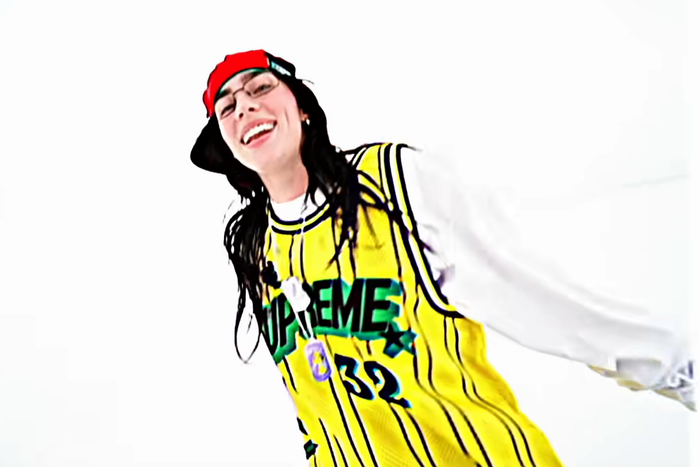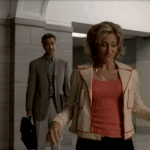
“Am I acting my age now? / Am I already on the way out?” Billie Eilish croons in a beguilingly sweet tone in “Skinny,” the opener from her new album, Hit Me Hard and Soft. It’s a jarring turn in a tune that otherwise just catches us up on romantic wrinkles since her last release, 2021’s Happier Than Ever, wondering why we always conflate a petite frame with a satisfied mind. “Skinny”’s trip into the artist’s concentric layers of stress — self-love, relationship turmoil, and ever-shifting public perceptions — outlines the sky-high expectations weighing on Eilish, a nine-time Grammy winner, to cut an elegant figure and use her platform responsibly while continuing to release work worthy of the voice-of-a-generation whispers that, at 22, come with joining Elton John and Randy Newman in earning two Academy Awards for Best Original Song. Soft picks up where Happier left off, offering a peek at a life in the shadow of mass adulation but also obsession and aggression. The album is a people pleaser’s contract renegotiation: You’ll get the hits you’re looking for after you hear how much of a trip it is to answer to countless observers harboring opinions about her every move.
The sense that Eilish faces unique stakes is apparent both in a surprisingly self-deprecating assessment of her sophomore album — “Anybody who was a big fan of what I was doing originally must have been completely astonished, and in negative ways, for sure,” she told Rolling Stone — and in the follow-up’s conciliatory observance of classic-album and mainstream-radio conventions. Under increasing scrutiny, she’d made a darker, more insular record that expressed her displeasure (“Is my value based only on your perception? / Or is your opinion of me / Not my responsibility?”) and landed contentiously among “when the party’s over” and “ocean eyes” fans miffed by all the throwback R&B and jittery dance-pop tracks. “Eat my dust my tits are bigger than yours,” Eilish wrote on TikTok that summer, inundated by worries that Happier would signal a “flop era.” Soft is the kind of course-corrective charm offensive an artist initiates to bounce back after a flop, but Happier’s only crime was neglecting to win every award and outsell 2019’s meteoric When We All Fall Asleep, Where Do We Go?. The second album was a wise pivot; if she went with a double-dip of claustrophobic anti-party anthems like “xanny,” she’d be fielding flash-in-the-pan allegations; admirers of the debut’s unpredictable sonic palette should never have expected Eilish to repeat herself. The incident revealed how low the margin of error is for the singer. She’s returned with a little something for everyone: demonic house music, introspective soft rock, catchy post-punk, seasick sophisti-pop.
Eilish and her brother and producer, Finneas, mostly steer clear of the first album’s mischief and abrasiveness, opting for tamer sonics and the occasional song suite or callback for agitated fans of Fall, which excelled at those. Despair is instead dramatized in drippy adult-contemporary rockers and bubbly pop jams that — unlike her breakthrough tunes that stuck out in playlists rather than trying to fit in — bring Eilish’s art more in line with her peers on the radio. Happier seemed to admire the architecture of mid-’90s pop charts, and as Soft serves scoops of the saccharine catharsis of No Doubt’s “Don’t Speak” alongside bass-heavy dance-floor workouts, it feels like Eilish is poking around past and present trying to make up her mind about a possible next direction. On the one hand, it speaks to the sheer amount of music the prodigious sibling act is synthesizing on Soft, which can match the tuneful menace of R&B classics like Jazmine Sullivan’s “Bust Your Windows,” the dour dance-punk indie-sleaze that retrospectives lionize, and the antiquated glamour of classic Disney themes. This all comes into play on album-closer “Blue” — part rocker, part trap jam, and part torch song — which reworks a demo from Eilish’s teens, showing off how much she has evolved as a singer and stylist.
That vaunted first-album aesthetic — a shroud of suffocating quiet, an ominous melody, a lyric sheet exuding a sense of imminent calamity like “my strange addiction” or “all the good girls go to hell” or “bad guy” — is useful for Soft’s scant love songs. A few years on, the singer biting her tongue in 2018’s puckish “you should see me in a crown” is the erudite palate behind “Lunch” and “The Diner,” where same-sex appetites are granted noirish airs. “Lunch” carries the artist’s most overtly horny utterance — “I could eat that girl for lunch” — while “Diner” follows the prior album’s “NDA” in pondering the obsessions that could lead a person to break into a favorite pop star’s family home: “I saw you on the screens / I know we’re meant to be / You’re starring in my dreams / In magazines.” Closing out on a phone number that can set the listener up with WhatsApp updates from Eilish, “The Diner” seems to say, “Love me reasonably, and distantly, via appropriate channels.” “Diner” and “Lunch” detail two ways love sours, contrasting the singer’s meet-cute with someone who would go on to break her heart with the catalyzing delusions of her stalker. Soft says nobody gets what they want: The violent admirer is carted off, and the romantic shooting shots in “Lunch” is already regretting it when the next song, “Chihiro,” hits.
“Chihiro” and “Birds of a Feather” typify Soft’s elaborate balancing act. Eilish is exorcizing an awful time in her life while selling prospective soundtracks to lighter moments in ours. Both songs tap familiar formulas, the former smelling like old French house (or, to be more specific, the reduction of it heard in 2010s Ye albums) and the latter conjuring the relative tempo and sunny feel of Drake’s “Hold On, We’re Going Home” as a jangly guitar riff threatens to veer into Sixpence None the Richer’s “Kiss Me.” While whispering and shouting through effects in the track named for the lead character in Spirited Away, Eilish invokes the Hayao Miyazaki film’s waterlogged sensory overload to explore feelings of separation from her ideal world and circumstances, but the lyrics aren’t all driving that home: “Wringing my hands in my lap / And they tell me it’s all been a trap / And you don’t know if you’ll make it back / I said, ‘No, don’t say that.’” Sailing curt, gorgeous phrasings across a tight delay in “Birds of a Feather,” Eilish delivers one of her finest vocal performances, successfully selling the melodrama in the verses: “I want you to stay / ’Til I’m in the grave / ’Til I rot away.” The couple is doomed; the album never musters this excitement for a love interest again. But we can pry the song out of the context of the record’s sad story to gush over a crush, resonating with the deep yearning on display.
As Soft treads easy-listening waters, its sentimentality and the firmness of its handle on pop-rock history can work to its disadvantage. The midsection is a surfeit of four- and five-minute tearjerkers attempting colorful twists on the classic lovelorn rock ballad, which throttle the pacing of the short album while giving proof to admirable versatility. In Eilish’s Variety interview last year, Finneas bristled at music consumption on TikTok and anticipated pop culture breaking away from absorbing songs in miniature and migrating back to meatier works. Soft delivering a handful of the longest songs in Eilish’s catalogue suggests that form is a provocation, or at least that if audience tastes cut in another direction and album-length statements suddenly enjoyed the traction bits that hit singles now do, the duo would have product to meet the demand.
“The Greatest” offers the kind of hair-raising, open-throated vocal naysayers like the grouches in “Skinny” have been clamoring for the notoriously wispy singer to release for ages, and the album makes you fight for the payoff, braving a trio of longer AOR jams for a pop of boisterous piano-rock. “The Greatest” takes its sweet time exposing the chorus’s loud chest-beating — “Man, am I the greatest / My congratulations / All my love and patience / All my admiration” — as bluster in the deadly directness of the bridge: “I loved you / And I still do / Just wanted passion from you / Just wanted what I gave you / I waited / And waited.” When the riff first teased in the opener finally resurfaces in “The Greatest,” it’s not the whiff of Coldplay sending the song into the stratosphere at its climax but the revelation of an unexpectedly powerful rock shout. A breathtaking clearing rewards the trip into the bramble, but framing this seesaw of shipwrecked folk-rock and emotional dance-pop as atonement for the quirks of Happier intrigues.
Soft can be gleefully disorienting: “L’amour de Ma Vie” offers a terse character study — “You said you’d never fall in love again because of me / Then you moved on” — as it zips between extremes on a beat shift delivering throbbing, auto-tuned house music after a somber alt-rock pump-fake. It’s a riot tracking these turns, but ultimately they saddle Soft with the timeless plight of the moody junior installment following impactful freshman and sophomore albums, the quest to reach new creative heights not by rehashing or quite rejecting the sound of a beloved debut but by pursuing a secret, self-aware third path. Avoiding an advance single suggested that Soft should be absorbed in one sitting as a unified work (while intercepting pre-release histrionics about the quality of the music). Eilish and Finneas want to make it known that they’re versatile players, and the sheer breadth of styles any six minutes of album touches on drives the point home. But, sometimes, when you get to the moment of release the contemplative slow songs are often driving toward, you wonder why they traversed a time-consuming, scenic side-street path to the party when they could’ve hit the highway.





